“Today’s American system values upheaval; it’s been a while since we’ve seen too much of it. But Americans who lived through the Depression knew the pain real disruption can bring. Today’s Chinese, looking back on their country’s last century, know, too. With a lack of tragic imagination, Americans have drifted into an arrangement that is comfortable while it lasts, and could last for a while more. But not much longer.” The Atlantic‘s James Fallows examines the unstable financial codependence between China and the United States, and how it could all too easily unravel. “Lawrence Summers calls today’s arrangement ‘the balance of financial terror,’ and says that it is flawed in the same way that the ‘mutually assured destruction’ of the Cold War era was…With allowances for hyperbole, something similar applies to the dollar standoff. China can’t afford to stop feeding dollars to Americans, because China’s own dollar holdings would be devastated if it did. As long as that logic holds, the system works. As soon as it doesn’t, we have a big problem.” Update: Make that 1.53 trillion.
Category: China
Lust in Translation.
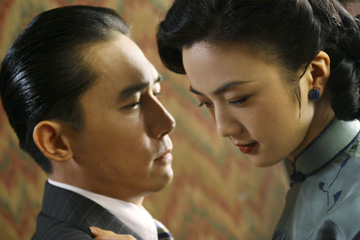 Attempting to be Last Tango in Shanghai by way of Paul Verhoeven’s Black Book, or at the very least to cast straight sex in as taboo a light as the gay love of Brokeback Mountain, Ang Lee’s Lust, Caution is, the lurid promise of its NC-17 rating notwithstanding, sadly a bit dull. As with most of Lee’s oeuvre, the film is ravishingly beautiful throughout, and it recreates WWII Shanghai much more evocatively than, say, Soderbergh’s The Good German did Berlin. But, at two hours and forty minutes, the film also feels overlong, and its central conceit — female agent deep undercover, deep under the covers — is burdened with entirely too much in the way of backstory. Lust, Caution isn’t a bad film by any means, but, its occasional explicitness notwithstanding, it doesn’t make for a particularly memorable one either.
Attempting to be Last Tango in Shanghai by way of Paul Verhoeven’s Black Book, or at the very least to cast straight sex in as taboo a light as the gay love of Brokeback Mountain, Ang Lee’s Lust, Caution is, the lurid promise of its NC-17 rating notwithstanding, sadly a bit dull. As with most of Lee’s oeuvre, the film is ravishingly beautiful throughout, and it recreates WWII Shanghai much more evocatively than, say, Soderbergh’s The Good German did Berlin. But, at two hours and forty minutes, the film also feels overlong, and its central conceit — female agent deep undercover, deep under the covers — is burdened with entirely too much in the way of backstory. Lust, Caution isn’t a bad film by any means, but, its occasional explicitness notwithstanding, it doesn’t make for a particularly memorable one either.
As Lust, Caution begins, it’s 1942 in Japanese-occupied Shanghai, and four wealthy women, seemingly above the harsh impositions of wartime, exchange gossip and veiled state intel over a friendly game of Mahjong. Among this quartet are Yee Tai Tai (Joan Chen), wife of the secret police chief (Tony Leung), and one Mak Tai Tai (Tang Wei), the young and beautiful spouse of a Hong Kong importer. But, as we soon discover (after she leaves the game and makes a suspicious phone call in an English cafe), Mak Tai Tai does not in fact exist. Rather, we are to learn in a very extended flashback (it’s Michael Clayton all over again), she is Wong Chia Chi, a resistance agent whose journey to that Mahjong table began four years earlier, as a displaced schoolgirl in Hong Kong. Falling under the spell of a handsome, earnest young patriot (Wang Lee Horn) then, Wong, a lover of movies, begins appearing in nationalistic plays to much acclaim. And, when it is decided by her schoolyard coterie of six that more drastic action should be taken to fight the Japanese invader, she takes on the role of an importer’s wife to lure a key collaborationist, the aforementioned Mr. Yee, to his demise.
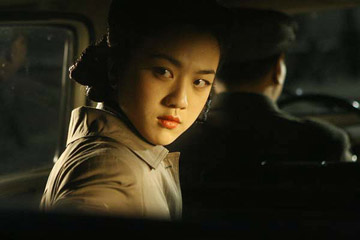 But trapping Mr. Yee poses several quandaries for these budding freedom fighters. For one, there is the rather delicate matter of how an inexperienced virgin could pass for a married woman. For another, this Yee is no provincial rube, but a man who’s at once deeply careful and extremely untrusting. Most problematic, Mr. Yee is no ugly, oafish lout, but the one-and-only Tony Leung, and hardly anybody in this world looks better smoking artfully in period suits than Tony Leung. Nevertheless, the kids go for it…with mixed results. And, when a spy is needed by the real Resistance to trap Mr. Yee a few years down the line, they find one ready-made in Wong, who takes on her role anew with even higher stakes. Only now, she discovers, Mr. Yee is more cruel than he first lets on, and very much into the rough stuff, sexually speaking. And, more to the point, once the Pandora’s Box of her own sexuality has been jarred open by Yee, Wong begins to lose herself in the part, to the detriment of all…
But trapping Mr. Yee poses several quandaries for these budding freedom fighters. For one, there is the rather delicate matter of how an inexperienced virgin could pass for a married woman. For another, this Yee is no provincial rube, but a man who’s at once deeply careful and extremely untrusting. Most problematic, Mr. Yee is no ugly, oafish lout, but the one-and-only Tony Leung, and hardly anybody in this world looks better smoking artfully in period suits than Tony Leung. Nevertheless, the kids go for it…with mixed results. And, when a spy is needed by the real Resistance to trap Mr. Yee a few years down the line, they find one ready-made in Wong, who takes on her role anew with even higher stakes. Only now, she discovers, Mr. Yee is more cruel than he first lets on, and very much into the rough stuff, sexually speaking. And, more to the point, once the Pandora’s Box of her own sexuality has been jarred open by Yee, Wong begins to lose herself in the part, to the detriment of all…
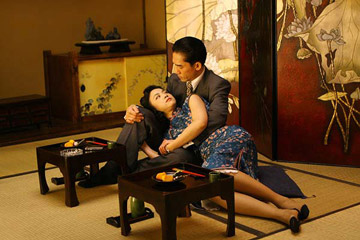 WWII spies, steamy, illicit sex…this seems like it should be an enticing concoction, to be sure…obviously it was right up Verhoeven’s alley in Black Book. But, as several reviewers have put it, Lust, Caution turns out to be much more cautious than it is lustful. Even if you factor out the extra hour of padding here, that’s a problem. Ang Lee’s films, among them Crouching Tiger, The Ice Storm, and Brokeback, have always been noted for their delicacy and artful restraint, which is frankly why he may not have been the best choice for this material, about a couple who lose themselves in sexual passion. The much-discussed sex scenes aren’t as puritanically minded as the nightmare visions of Requiem for a Dream, but there’s a definite coldness and frigidity about them, as if neither participant is having very much fun. They’re not so much erotic as they are animalistic, all acrobatic contortions and grunted yelps. I guess you could argue that’s the point — the two are driven not by love at all but by an inexplicable earthy necessity, and Lee even cuts to a growling German shepherd to forward that idea along. But, if that’s the case, if it’s all just physical — then why — spoiler here — when a key slip-up is made by one of the lovers, doesn’t it happen while in the throes of passion, rather than when one is presented with the sight of a shiny (dare I say gaudy?) bauble?
WWII spies, steamy, illicit sex…this seems like it should be an enticing concoction, to be sure…obviously it was right up Verhoeven’s alley in Black Book. But, as several reviewers have put it, Lust, Caution turns out to be much more cautious than it is lustful. Even if you factor out the extra hour of padding here, that’s a problem. Ang Lee’s films, among them Crouching Tiger, The Ice Storm, and Brokeback, have always been noted for their delicacy and artful restraint, which is frankly why he may not have been the best choice for this material, about a couple who lose themselves in sexual passion. The much-discussed sex scenes aren’t as puritanically minded as the nightmare visions of Requiem for a Dream, but there’s a definite coldness and frigidity about them, as if neither participant is having very much fun. They’re not so much erotic as they are animalistic, all acrobatic contortions and grunted yelps. I guess you could argue that’s the point — the two are driven not by love at all but by an inexplicable earthy necessity, and Lee even cuts to a growling German shepherd to forward that idea along. But, if that’s the case, if it’s all just physical — then why — spoiler here — when a key slip-up is made by one of the lovers, doesn’t it happen while in the throes of passion, rather than when one is presented with the sight of a shiny (dare I say gaudy?) bauble?
The acting in Lust, Caution is universally good, with special plaudits going to Tang Wei and Tony Leung. And sex is usually handled so sophomorically in films that I feel bad for faulting Lee’s unabashed use of it to further the story along here. But take away those few explicit scenes, and you’re left with a rather conventional snooze of a cloak-and-dagger movie, however lusciously filmed. And even the sex here could’ve used some of the sensuous warmth of Shanghai-born Wong Kar-Wai’s work. Sadly, when it comes to lust and caution in this film, Lust, Caution pretty much foregoes the red-light, and ends up raising more red flags than a Mao rally.
In a World of Hurt.
“Writing is a way to have a dialogue with yourself. You can never compete with something in the past, in memory. Like some people said, we love what we can’t have. In this world, the end becomes the beginning. It’s very unfair for anyone around him [Tony] in the present, because they can never compete with his imagination or his memory. We love what we can’t have, and we can’t have what we love.”
Since I spent Friday evening watching In the Mood for Love — a tale of a romance-that-almost-was, told in furtive hallway glances — and 2046 — a broader and more diffuse disquisition on love and heartache — back-to-back, here’s an intriguing 2004 interview with director Wong Kar-Wai on how they fit together: “Mood is a chapter in 2046. It’s like 2046 is a big symphony, and Mood is one of its movements.” Maybe so, but I’m glad I saw them as I did. At first Tony Leung’s Chow in 2046, a dissolute, world-weary rake, seemed eons apart from the quiet, somewhat nervous journalist of ITMFL. But the films are clearly meant to be taken as a piece. From its first images (hole, train) to its last (taxi, hole), 2046 dwells on the corrosive consequences for Chow of ITMFL: The memory of Su (Maggie Cheung), bottled up in the tree, is eating Chow alive…hence, the whole otherwise-non sequitur sci-fi subplot (ITMFL told again, by Chow to himself) involving the indecisive android. (Um, the last few sentences make more sense if you’ve seen the films, but only slightly.)
Now I really kinda wished I’d watched Days of Being Wild, the first part of Wong’s trilogy, before these two. But then again, however sumptuously filmed (these movies are absolutely gorgeous to look at), and however tempered by the presence of several stunningly beautiful actresses (Cheung, Zhang Zi Yi, Gong Li, Faye Wong), there’s only so much exquisite melancholy I can take in a given evening. By the end of this extended tale of romance and loss, I had half a mind to just curl up in a ball and drift amid a sea of despond for the rest of the night, lost in the phantom reverie that was both the allure and prison of “2046” in 2046. Even stronger was the urge to light a cigarette and watch the tendrils of smoke slowly writhe and curl through a shaft of light, preferably to the strands of some vintage Nat King Cole. If nothing else, these very worthwhile films suggest, if you’re going to ruminate on old heartaches, you might as well look really good doing it.
It Takes an Empire.
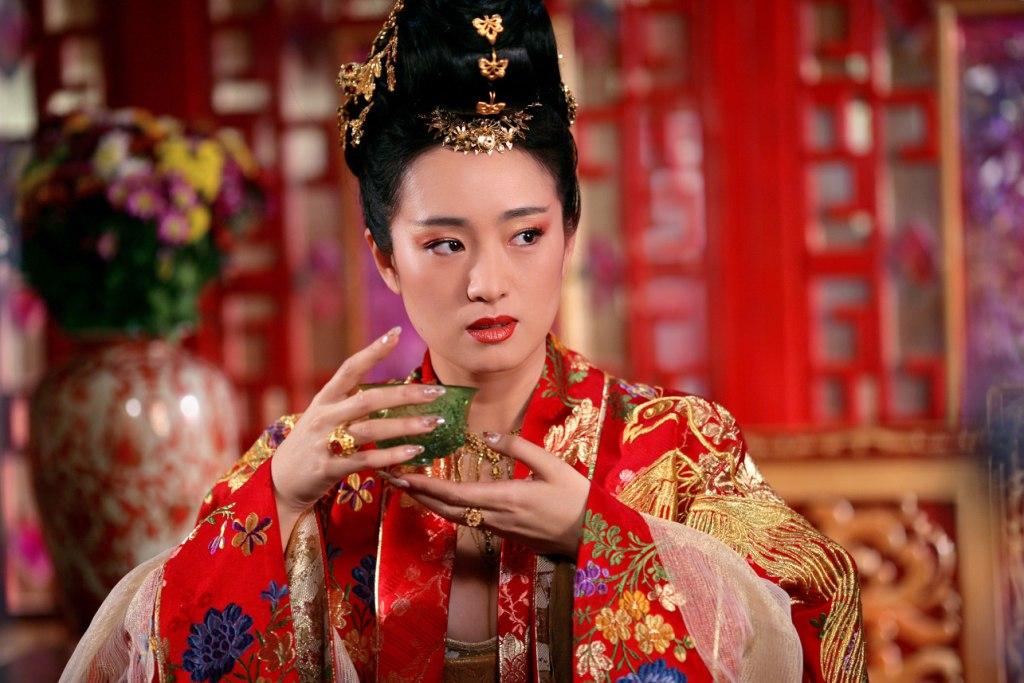
[%@*#, that’s aggravating. Movable Type just ate my entire review. Ok, let’s try this again.] A lush, operatic saga of a cancerous ninth-century family fracas that threatens to topple the Tang Dynasty from within, Zhang Yimou’s Curse of the Golden Flower is the type of film for which the cliche “sumptuous visual feast” was coined. True, this sordid tale of betrayal, corruption, incest, and time-release murder is overwrought to the point of self-parody, and the action sequences — like those in Zhang’s House of Flying Daggers — eventually veer well past rousing to the far corner of preposterous. But, my, is this film gorgeous to look at: From start to finish, Curse of the Golden Flower is an explosion of riotous color. (Particularly after sitting through two hours of Letters from Iwo Jima‘s bleak, monochrome grays, viewing the veritable kaleidoscope on display here felt even more sensuous and indulgent.) Throw in some very watchable performances by Chow Yun-Fat, Gong Li, and others, and Curse comes across to me as the best entrant in Zhang’s recent trilogy of fanciful-historical Chinese epics (That would be Curse, Daggers, and the scarily nationalistic Hero — Fortunately the political subtext is more restrained and ambiguous here. In fact, Curse may even be revolutionary, depending on how you read the film’s final image.)
It is the hour of the rat for the Tang Dynasty, chrysanthemums bloom throughout the Middle Kingdom, and opulence comingles with palace intrigue in the halls of the Forbidden City. For the Emperor (Chow Yun-Fat, both fierce and serene), in his Divine wisdom, has seen fit to slowly and secretly poison his Empress (Gong Yi, equally good), by means of a deathly black fungus added to her daily medicine. The Empress, meanwhile, strains to rekindle her romance with the Emperor’s first son (by a previous marriage), the Crown Prince Wan (Liu Ye), but he only has eyes for a fetching maid (Li Man) in the imperial employ. (In fact, she is the daughter of the doctor administering the poison.) And also residing in this increasingly broke down palace are the Princes Jai (Jay Chou) and Yu (Qin Junjie), both of whom discover they have their own roles to play in the schemes of their feuding parents, particularly after the ailing Empress weaves a plot of vengeance to coincide with the coming festival…
Also milling about the Forbidden City is a cast of hundreds: the cooks, maids, laborers, soldiers, ninjas (Yes, this film has ninjas, or at least their Chinese equivalent), and ladies-in-waiting that make up the infrastructure undergirding the Tangs’ divine rule. Zhang goes out of his way here to emphasize the sheer amount of sweat and toil expected of this teeming support staff for even the most mundane task — It takes at least four servants to administer the Queen’s medicine and considerably more to cart the Emperor to and fro. Yet, Zhang seems to suggest, these people are as much part of the story as the resentful royals. They are the props of the extravagant ritual, rigid hierarchy, and striking beauty that characterize the Tang’s rule, and they are ennobled by knowing and playing their appropriate role in this imperial order. Whether or not you agree with this sentiment (and Zhang himself seems to cast doubt on it by the final shot), it does make for several breathtaking scenes of elaborate ceremony throughout the film.
And, yes, some of these are battles. To be honest, both Hero and House probably exhibited better fight choreography. If you come to Curse expecting a martial arts extravaganza akin to those films, you may well leave disappointed. I found the final Helms’ Deepish “silver versus gold” sequence to be too bloodthirsty (beheading prisoners and such), too unrealistic (here, more than anyone else in the film, physics don’t apply) and too obviously CGI for my taste. That being said, there are a few notable melees interspersed throughout the picture, most of them involving the black-clad, scythe-wielding “Flying Monkey”ish ninjas of the Imperial Army, who tend to swoop down from above and bury their scythes in the nearest possible revolutionary with extraordinary aplomb. (Sigh. Only one movie after Iwo Jima, and war and violence are already being made to look artful again.)
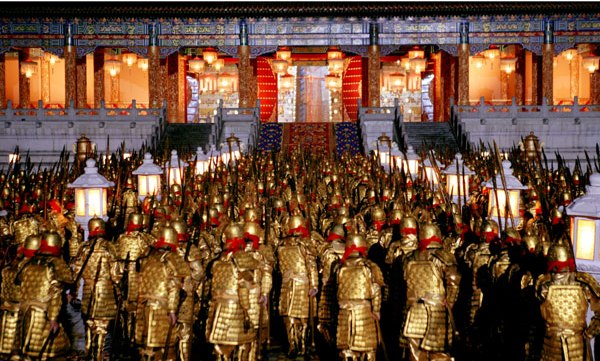
Al Liars.
“‘Saddam only expressed negative sentiments about bin Laden,’ the former Iraqi foreign minister, Tariq Aziz, told the Federal Bureau of Investigation when he was asked about Osama bin Laden, Al Qaeda’s leader…’He specified that if he wanted to cooperate with the enemies of the U.S., he would have allied with North Korea or China,’ says a passage in the nearly 400-page report.” A new Senate intelligence report confirms what has become patently obvious: There was no link between Iraq and Al Qaeda before the war. “Sen. Carl Levin, D-Mich., a member of the committee, said the long-awaited report was ‘a devastating indictment of the Bush-Cheney administration’s unrelenting, misleading and deceptive attempts’ to link Saddam to al-Qaida.”
Trailer Convoy.
Several items for the trailer bin:
* Diane Lane and Thomas Jane go on the lam to escape hitmen Mickey Rourke and Joseph Gordon-Leavitt in this glimpse at John Madden’s Tarantino’ed-up version of Elmore Leonard’s Killshot. (Johnny Knoxville and Rosario Dawson are involved in some fashion as well.)
* Chow Yun-Fat and Gong Li gear up for some trademark Zhang Yimou wire-fu (a la Hero and House of Flying Daggers) in the new teaser for Curse of the Golden Flower.
* Nicole Kidman ventures through the photographic looking-glass as Diane Arbus in Fur: An Imaginary Portrait of Diane Arbus, the new film by Secretary‘s Steven Shainberg, also with Robert Downey Jr. (Mirrored here.)
* Helen Mirren jumps from Elizabeth I to Elizabeth II in this look at Stephen Frears’ The Queen, concerning Buckingham Palace’s reaction to the death of Princess Diana. (I have zero interest in the subject matter, frankly, but I do like Mirren, Frears, and James Cromwell, and there’s an iffy Tony Blair impression here by Michael Sheen, to say nothing of the guy playing Prince Charles.)
* Finally, Guillermo del Toro returns to the faerie Spain of The Devil’s Backbone in this rapid-edit teaser for Pan’s Labyrinth. (Being on a lousy hotel connection, I couldn’t get this link to work, but I believe the same teaser is mirrored here.)
Beijing Moon.
Also in news-of-the-future, China sets a lunar launch date of 2024.
Asleep at the Switch.

Ladies and gentlemen, meet our crack foreign policy team, who apparently decided to catch some Z’s during the slight-happy official state visit of Chinese president Hu Jintao. China…sure, this one’s not important. Might as well get some shut-eye.
Report Card: Incomplete.
By way of a friend, the State Department releases its mandated yearly human rights report for 2005 (here), finding cause for alarm in Iran, Russia, China, Venezuela, Burma, North Korea, Belarus and Zimbabwe and (surprise, surprise) progress in Iraq and Afghanistan. The report doesn’t delve into human rights violations here at home (although China tries to fill that gap in response every year), but it does unequivocally state — in bold, no less — that “countries in which power is concentrated in the hands of unaccountable rulers tend to be the world’s most systematic human rights violators.” Hey y’all might be on to something. Deadpans the head of Amnesty International: “The Bush administration’s practice of transferring detainees in the ‘war on terror’ to countries cited by the State Department for their appalling human rights records actually turns the report into a manual for the outsourcing of torture.”
A “Lunar Armada.”
The LA Times examines the beginnings of the second lunar space race, which will involve, among others, the US, Europe, China, and India. “Some researchers even have a name for the first lunar city: Jamestown, in honor of the first English settlement in the New World.“
